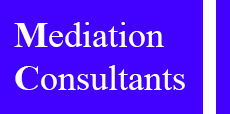The object of mediation is to assist the parties to arrive at a satisfactory solution to their conflict. Of course, some parties may have chosen to instruct a solicitor before the mediation, others may even be approaching a court hearing, while a number may have had a hearing adjourned; mediation at any stage is possible as long as both parties are positive about attempting to reach a settlement.
Both parties should accept from the outset that the purpose of dispute resolution is not to achieve a win or triumph over the other. Both may need to reformulate their stance with the aim of achieving a suitable or appropriate settlement.
Mediation resolves disputes fast, it has an extremely high success rate and is less expensive than the legal fees associated with litigation. Parties that mediate avoid the uncertainty of decisions made by the court.
1. What normally happens at a mediation?
Each mediation will obviously differ depending on the issues concerning the parties. Usually the parties will attend on their own, however, you may wish to attend with a friend, family member or lawyer. The friend, family member, or lawyer may comment where appropriate. However, if the other party feels uncomfortable, inhibited, or intimidated by their attendance, s/he may be asked to remain in another room during any joint discussions.
Before the mediation, the mediator will make contact with both parties, get an outline of the dispute and discuss whether mediation is suitable for them. The mediator will not disclose details of the discussion that s/he has had with either party to the other unless s/he has specific permission to do so.
The mediation usually commences with both parties meeting with the mediator together and setting out what their aims/objectives are for the mediation. The parties will then move to separate rooms and the mediator will see each party individually. At this stage, the parties are able to speak freely about the dispute and consider any proposals for potential settlement.
It may be that the parties come together at the end of the mediation and reach an agreement.
2. What if we don’t reach an agreement?
It is not always possible to reach an agreement, particularly on the first occasion. The parties should not see this as a failure. Mediation is never a failure because the parties will have shared the desire to settle and will have been able to identify and clarify areas of dispute. This will ultimately allow them to move forward at a more proactive pace to resolve the dispute.
3. What if we do reach an agreement?
If you are able to agree a satisfactory resolution then the mediator will draft a Memorandum of Understanding or Heads of Agreement. This document sets out clearly what has been agreed between the parties and the terms upon which settlement has been reached. The document will then be signed and dated by the parties and the mediator.
If for some reason the agreement is not affected by either party and the matter is ultimately adjudicated upon by the courts, a Judge will view this document as a binding agreement.
However, there may be occasions where a party asks a Judge to ignore the agreement due to some new information (or existing information subsequently discovered). It is always an available option for a Judge to permit this. The party who seeks to renege from the agreement will have to persuade the court that the new event undermines the agreement to the extent where compliance would lead to an inequitable outcome.
Ultimately the agreement is a powerful document that the courts will attempt to give effect to wherever possible. Therefore, the parties must be clear about the terms of the agreement before they sign. It is always open to a party to seek legal advice before signing the agreement if they require.
Benefits of Mediation
1. Mediation is less expensive than litigation?
Mediation is informal and there are no requirements to instruct solicitors, barristers or experts. It emphasises the resolution of disputes without the need for protracted litigation.
2. Parties that mediate avoid the uncertainty of decisions made by the court
Unlike litigation, mediation actively involves the parties in the dispute resolution process ensuring control and decision making remains in their hands.
Mediation enables the parties to communicate, via the facilitator exactly what they hope to achieve from the process and allows for creative solutions which a Judge would not be able to make.
This approach enables parties to preserve or restore good relationships and clearly goes to the heart of Lord Woolf’s emphasis on co-operation rather than adversarialism. Even if a settlement is not reached through the mediation, it may assist by narrowing the issues in dispute between the parties reducing the time for litigation.
3. Mediation resolves disputes fast
Mediation can potentially offer a quicker, more direct route to dispute resolution. Many businesses have recognised the procedural time difference between litigation and mediation and therefore utilise mediation as an alternative method to resolve disputes that have the potential to drag on. For individuals, the whole litigation procedure often appears daunting. However, mediation provides the forum to enable and empower parties to arrive at their own decisions.


 Book a free call
Book a free call




